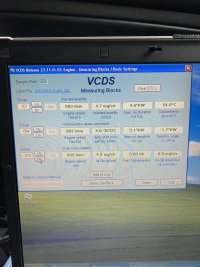sidepod
Super Poster
Lifetime VIP Member
- Messages
- 6,955
- Vehicle
- T4 PopTop
So here’s an interesting thing (depending on your definition!).
A lot of the Cali engines, I believe, are PD engines (that’s Pump Douze. The camshaft drives individual injection units for each cylinder).
I have a Golf with a PD lump in it with which I’m trying to diagnose a problem.
Long story short, the PD engine has a vernier sprocket arrangement on the cam allowing variations in cam timing. Anyone who’s built a performance engine will be familiar with cam timing. It’s either measured with a degree wheel or, my preference, amount of lift at TDC using a DTI.
VW specify a range of adjustments for the cam timing, so as long as it’s within these values all should be peachy. It’s basically measuring the offset between cam and crank via two sensors.
It’s referred to as torsional value.
So, digging around on the net on various forums it seems this variation can alter not only performance but fuel economy, by as much as 4-6 mpg. Not too shabby for some who monitor this kind of thing.
From what I’ve read (and there’s a lot out there!) it depends on how well the engine has been setup after a belt change and whether the tech has taken the time to check it.
It need’s VCDS to see what’s going on
Here’s a snapshot of what I saw with my Golf.

You can see on the middle row, far right the Synchro angle. This is the cam timing adjustment (simple mod on the sprocket, loosen bolts, tweak, retighten). Value is KW, German translation for camshaft/crankshaft.
Above and below are fuel usage/consumption values. Playing with the cam timing affects these values.
Reading what others do, they concentrate on tweaking the fuel values as opposed to the camshaft figures (keeping it within spec obvs).
It can take a few trial runs to get it right and there’s no one optimal setting for every vehicle. Due to the nature of the camshaft drive train there is a big old tolerance stack up so each vehicle needs its own massaging.
Apparently the value measured on the production line is hand written on the belt cover of the engine.
So if fueling is your thing and you have a tech who’s happy to play then there could be a gain to be had.
Here’s a link to 15 pages of bobble hattery.
 forums.tdiclub.com
forums.tdiclub.com

A lot of the Cali engines, I believe, are PD engines (that’s Pump Douze. The camshaft drives individual injection units for each cylinder).
I have a Golf with a PD lump in it with which I’m trying to diagnose a problem.
Long story short, the PD engine has a vernier sprocket arrangement on the cam allowing variations in cam timing. Anyone who’s built a performance engine will be familiar with cam timing. It’s either measured with a degree wheel or, my preference, amount of lift at TDC using a DTI.
VW specify a range of adjustments for the cam timing, so as long as it’s within these values all should be peachy. It’s basically measuring the offset between cam and crank via two sensors.
It’s referred to as torsional value.
So, digging around on the net on various forums it seems this variation can alter not only performance but fuel economy, by as much as 4-6 mpg. Not too shabby for some who monitor this kind of thing.
From what I’ve read (and there’s a lot out there!) it depends on how well the engine has been setup after a belt change and whether the tech has taken the time to check it.
It need’s VCDS to see what’s going on
Here’s a snapshot of what I saw with my Golf.

You can see on the middle row, far right the Synchro angle. This is the cam timing adjustment (simple mod on the sprocket, loosen bolts, tweak, retighten). Value is KW, German translation for camshaft/crankshaft.
Above and below are fuel usage/consumption values. Playing with the cam timing affects these values.
Reading what others do, they concentrate on tweaking the fuel values as opposed to the camshaft figures (keeping it within spec obvs).
It can take a few trial runs to get it right and there’s no one optimal setting for every vehicle. Due to the nature of the camshaft drive train there is a big old tolerance stack up so each vehicle needs its own massaging.
Apparently the value measured on the production line is hand written on the belt cover of the engine.
So if fueling is your thing and you have a tech who’s happy to play then there could be a gain to be had.
Here’s a link to 15 pages of bobble hattery.
PD Engines - The Problem of Setting Torsion Value
When we reference torsion value in the forum we should use the actual cam position referenced against TDC. Early VCDS positive was advanced cam timing, latest VCDS negative is advanced cam timing.

Last edited:















